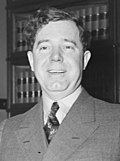Campaign
Despite negative coverage by the majority of the state's newspapers, Long managed to gain the support of the New Orleans States and the Shreveport Times. The New Orleans Times-Picayune and the Shreveport Caucasian supported Simpson, while the New Orleans Item supported Wilson. Long's seemingly inexhaustible energy gave him an advantage, as he managed to travel extensively across the state, making several stops a day in rural areas neglected by the other candidates. Long's theatrical oratory combined insulting his opponents and the corporations he blamed for the state's underdevelopment with promising increased educational funding, free textbooks, public hospitals, and free bridges and road improvements. He also campaigned against the corruption and wastefulness of previous administrations. Simpson and Wilson, offering only bland defenses of the status quo, were often overwhelmed when appearing alongside Long at debates and other campaign events. A widely publicized fistfight between Long and former governor Jared Y. Sanders during the campaign did nothing to damage Long's popularity.
Long spent the intervening four years building his reputation and political organization, particularly in the more urban South, which was heavily Roman Catholic due to its French and Spanish heritage. Despite disagreeing with their politics, Long endorsed and campaigned for Catholic US Senators in 1924 and 1926. [1] Thanks to alleged government mismanagement during the Great Mississippi Flood of 1927, which has been compared to the aftermath of Hurricane Katrina, [2] Long gained the support of Cajuns, rural Catholics whose land had been heavily affected. [3] He officially launched his campaign in 1927, campaigning with the slogan, "Every man a king, but no one wears a crown," a phrase adopted from Democratic presidential candidate William Jennings Bryan. [4] By 1928, Long had gained such momentum, that he became one of the major talking points of his opponents; opposing political conventions chanted "It won't be Long now." [4]
Long was a fervent critic of a toll bridge being constructed across Lake Pontchartrain by incumbent Governor Oramel H. Simpson, instead promising a toll-free bridge. [4] Long developed novel campaign techniques, including the use of sound trucks at mass meetings and radio commercials. [1] His stance on race was unorthodox. Unlike other southern demagogues, Long was, according to T. Harry Williams, "the first Southern mass leader to leave aside race baiting and appeals to the Southern tradition and the Southern past and address himself to the social and economic problems of the present." [5] [6] [note 1] The campaign sometimes descended into brutality. When the 60-year-old Simpson called Long a liar during a chance encounter in the lobby of the Roosevelt Hotel, Long punched him in the face. [8]
Results
Following the lopsided showings of the primary, Simpson refused to support Wilson in the runoff and Wilson withdrew from the race.
Long carried 47 of 64 parishes, including the majority of rural parishes in both Anglo-Saxon Protestant northern and French Catholic southern Louisiana, a nearly unprecedented accomplishment up to that time. Only New Orleans, still firmly controlled by the Regular Democratic Organization, spurned Long in favor of the machine's chosen candidate Wilson. The political upheaval of Long's 1928 victory spurred a realignment in Louisiana politics based on urban-rural and class-based divisions rather than the religious and cultural divisions which had predominated up to that time. In every state election from 1928 to 1960, the legacy of Huey Long would be the primary campaign issue.




